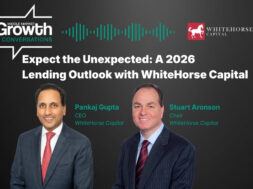Dealmaker Q&A: Inside a Strategic AI Acquisition
OpenVenture CEO Rathnakumar Udayakumar opens up about the recent InVerse acquisition

OpenVenture, a tech platform with private equity and venture investments and a mission to support students, workers, and entrepreneurs immigrating to the U.S, recently acquired InVerse, an AI startup with proprietary machine learning algorithms that deliver improved efficiency. The strategic deal will allow OpenVenture to offer more scalable and efficient AI solutions to their core immigrant customer base, says OpenVenture’s CEO Rathnakumar Udayakumar, who spoke to Middle Market Growth about the deal and their plans for integration.
Middle Market Growth: Can you start by telling me a little bit about OpenVenture? I understand that it’s both a tech investment firm and an immigration concierge service, but can you tell me more about how those two parts fit together?
Rathnakumar Udayakumar: So yes, we are a tech-based platform, but OpenVenture’s fundamental value is to be able to work with immigrant founders, immigrant entrepreneurs, immigrant students, and the immigrant community at large, because that’s a very new set of people that come into a country. They need a lot more support and handholding than others. We want to focus more on immigrants because from our analysis, immigrant founders contribute more at a ratio level, and Nikin and I, the founders [of OpenVenture], are immigrants ourselves. We know the pain points of these clients because we have been through that journey ourselves: I have been a student in the U.S., I’ve been an employee in the U.S., a visa recipient in the U.S., I’ve been an entrepreneur in the U.S., so there are a lot of things that you can connect to.
MMG: Now, what were you looking for in an investment, and how did InVerse fit those requirements?
RU: We were looking, number one, for a very strategic fit. We had a certain vision looking at a technology segment and we were looking for platforms that had the ability to not just be what they are today, but to be expanded, and the scope of their segment could be expanded as well. The biggest reason behind our choice of going with InVerse was because it sits well within our technology and our IP requirements. It kind of helps us connect the dots.
This acquisition of InVerse was a very strategic investment because, like I said, we are here to solve the pain points of immigrants at large, but we have a personal interest in the technology field more broadly. We are already in the world of creating a hub and ecosystem for AI agents that plays into [our mission]. So, thinking about it like a GitHub sort of ecosystem for both the developers and consumers of AI agents, we are trying to build that ecosystem where I can be an AI enthusiast and be able to build my own agents, or I can be a consumer, be a company, or B2B or B2C and be able to use agents as well. We want it to be not just a marketplace, but a developer ecosystem.
MMG: Looking at the tech and AI space more broadly, what are some of the biggest challenges right now, and how are you planning to drive growth despite those?
RU: I think the biggest challenge is the abundance of information available. Gone are the days where the challenge was, hey, I don’t have access to knowledge or access to the hub. Everybody can sit in their living room today and be like, hey I built my own agent in company—and I’m not saying it’s not possible, but it dilutes the water too much. You don’t know what is right and what is not. It’s like I can go and check Google myself and say, hey, I have a headache, and it might just give me a result saying you have a tumor. That’s exactly the scale at which the information processing is happening at this point in time, and it’s tough to sort of narrow down what you’re looking for. The abundance of information has become the biggest bottleneck.
I could want to be doing something, and there are a hundred other people doing it, and if I get even a little more traction, there’s a thousand others who want to do it because there’s traction in the market. What this does is it creates an illusion of abundance of opportunities or abundance of available solutions. For an end consumer, it is a tough decision, and people will undercut the cost and quality as well. So, building a very strong ecosystem play is not getting any easier, it’s getting tougher. The more open something gets the tougher it gets. For us, [the solution] will be to scale it. And that’s exactly what’s happening.
MMG: Can you tell me about your plans for growth as you incorporate InVerse into OpenVenture?
RU: The first 100 days is more focused towards the AI agents at large. We are making this code platform underneath where we are adding in a few IPs that we already have to create a much broader ecosystem. We are also looking at a few acquisitions. We have acquired a couple of other firms in the past and are currently in talks with some as well. There’s a lot more things we want to do, but we want to stick to our core goal of being a concierge service for integration for immigrants. Today, our central hub is the U.S. but we want to be a global player at some point and we are looking at other countries as well.
This interview has been edited and condensed for clarity.
Hilary Collins is ACG’s Associate Editor.
Middle Market Growth is produced by the Association for Corporate Growth. To learn more about the organization and how to become a member, visit www.acg.org.


